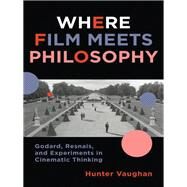Where Film Meets Philosophy
, by Vaughan, Hunter- ISBN: 9780231161329 | 0231161328
- Cover: Hardcover
- Copyright: 2/5/2013
Closely reading the films of Jean-Luc Godard and Alain Resnais, Hunter Vaughan establishes a connection between phenomenology and image-philosophy to analyze the moving image and its challenge to conventional modes of thought. Striving to establish a clear foundation for the recent field of inquiry called "film-philosophy," he devises a systematic theory of film's philosophical function and its deconstruction of classic oppositional concepts, such as subject and object, real and imaginary, and interior and exterior. After merging Maurice Merleau-Ponty's theory of subject-object relations with Gilles Deleuze's image-philosophy, Vaughan applies this rich framework to a comparative analysis of Godard and Resnais. Godard's work critiques the audio-visual illusion of empirical observation (objectivity), while Resnais's innovative play with the sound-image generates new, thrilling portrayals of individual experience (subjectivity). Both radically deconstruct classical film codes, upending conventional notions of subjectivity and, by reorganizing formal elements, reconfigure subject-object relations to alter our understanding of ourselves and the world. Films discussed include Godard's Vivre sa vie (1962), Contempt (1963), and his lesser-critiqued 2 or 3 Things I Know About Her (1967); Resnais's Hiroshima, mon amour (1959), Last year at Marienbad (1961) and his critically overlooked masterpiece, The War is Over (1966). Situating the formative works of these filmmakers within a broader philosophical context, Vaughan pioneers a phenomenological film semiotics that reconciles two disparate methodologies and joins them to the achievements of two seemingly oppositional artists.







